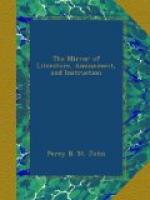A Lisbon Water-carrier earns about sixpence per day, the moiety of which serves to procure him his bread, his fried sardinha from a cook’s stall, and a little light wine perhaps, on holidays,—water being his general beverage, nay, one might almost say, his element. A mat in a large upper room, shared with several others, serves him in winter as a place of repose for the night; but during the summer he frequently sleeps out in the open air, making his filled water-barrel his pillow.
Vanity.—A young Lisbon dandy hearing an Englishman complain of the intolerable filth and stench of his metropolis, retorted that, for his part, when he was in London, it was the absence of that filth, and the want of the smells complained of, that had rendered his residence in our metropolis so disagreeable and uncomfortable to him. “No passion,” as Southey says, “makes a man a liar so easily as vanity.”
Dogs.—In Lisbon dogs seem to luxuriate under the violence of the heat, and to avoid the shady sides of the streets, though the thermometer of Fahrenheit be at 110 degrees; and scarcely an instance of canine madness is ever known to occur. When the French decreed the extinction of the tribe of curs that infest the streets, no native executioner could be found to put the exterminating law in force; nay, the very measure excited popular indignation.
Golden Sands.—Perhaps originally it was the fabled gold of the Tagus which attracted Jews to Lisbon in such numbers, and the general persuasion indeed is, that the yellow sands of this royal river did actually once produce sufficient gold to make a magnificent crown and sceptre for the amiable hands of that patriot sovereign, the good king Denis.
A Dinner.—A dish of yellow-looking bacalhao, the worst supposable specimen of our saltings in Newfoundland; a platter of compact, black, greasy, dirty-looking rice; a pound, if so much, of poor half-fed meat; a certain proportion of hard-boiled beef, that has never seen the salting pan, having already yielded its nutritious qualities to a swinging tureen of Spartan soup, and now requiring the accompaniment of a satellite tongue, or friendly slice of Lamego bacon, to impait a dull relish to it; potatoes of leaden continuity; dumplings of adamantine contexture, that Carthaginian vinegar itself might fail to dissolve; with offensive vegetables, and something in a round shape, said to be imported from Holland, and called cheese, but more like the unyielding rock of flint in the tenacity of its impenetrable substance; a small quantity of very small wine; abundance of water; and an awful army of red ants, probably imported from the Brazils—the wood of which the chairs and tables are made, hurrying across the cloth with characteristic industry;—such are the principal features of the quiet family dinner-table of the Portuguese.
The Dockyard of Lisbon is scarcely as extensive as many of the largest of our private ship-builders on the banks of the Thames and the Avon.




